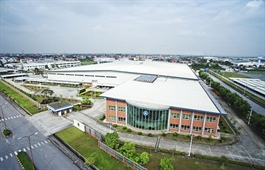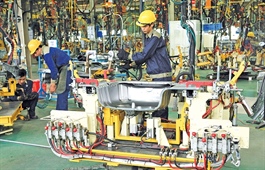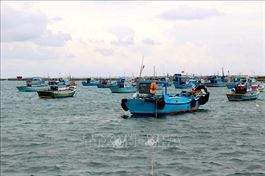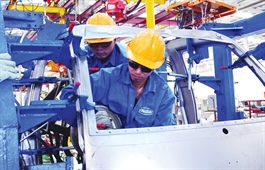Air, rail transportation for farm produce should be improved: experts
Air, rail transportation for farm produce should be improved: experts
Air and rail transportation should be promoted to transport farm produce to reduce logistics costs and increase the competitiveness of export products, experts have said.

Deputy Director of the Ministry of Industry and Trade’s Import-Export Department Tran Thanh Hai told a conference to connect agriculture firms with railways and airways on Tuesday in Ha Noi that logistics issues were making it difficult for Vietnamese agricultural products to make use of their competitive advantages.
Due to the nature of agricultural products, the logistics process required a smooth flow from production, harvesting, processing, packaging, storing, transporting to distributing, Hai said.
A survey showed road transportation remained the top choice to transport agricultural and frozen products due to flexibility and speed, especially when exporting to markets which share a border with Viet Nam.
The second was marine transport thank to its low cost, which was appropriate for exporting to long-distance markets and products with low seasonality.
Rail and air transportation were not very popular because of high costs and being inappropriate for agricultural products with low added value. Besides, these methods lack flexibility due to limited connectivity.
Experts said heavy dependence on road transportation for farm produce affected the competitiveness of the products as road transportation charges remained high and congestion often happened at border gates around peak harvest seasons.
The COVID-19 pandemic urged the need for airways and railways to improve the infrastructure system and service quality as well as increase the provision of cargo transport.
According to Nguyen Chinh Nam, head of planning and business department of Viet Nam Railways Corporation (VNR), to promote rail transportation for agricultural product, VNR was working with neighbouring countries to connect routes and service charges to provide the most reasonable fees to customers.
Nam said that transportation of agricultural products via railways remained modest, noting that 17,400 tonnes of farm produce were shipped abroad through railways in the first half of this year, or just 4 per cent of the total export cargo the industry handled.
Airlines are also converting passenger aircraft into cargo to increase the capacity of cargo shipments, helping bring air transportation charges down.
Do Xuan Quang, deputy director-general of Vietjet Air Cargo, said the scale of domestic carriers remained small compared with foreign firms. In addition, domestic airlines had not paid much attention to developing freight services.
Statistics showed foreign carriers accounted for 90 per cent of the global cargo shipment market.
Quang added that the cargo air transportation charges of domestic airlines remained high, adding that developing separate cargo airlines should be considered to cut costs.
He added that investment was needed to develop the system for storage and preservation to ensure quality for agricultural products.
From the viewpoint of a farm produce exporter, Nguyen Dinh Tung, general director of Vina T&T, said cargo air transportation was dependent on foreign carriers. Only when Viet Nam opened direct flights or had a fleet of freighters could logistics cost be reduced, he said.






















